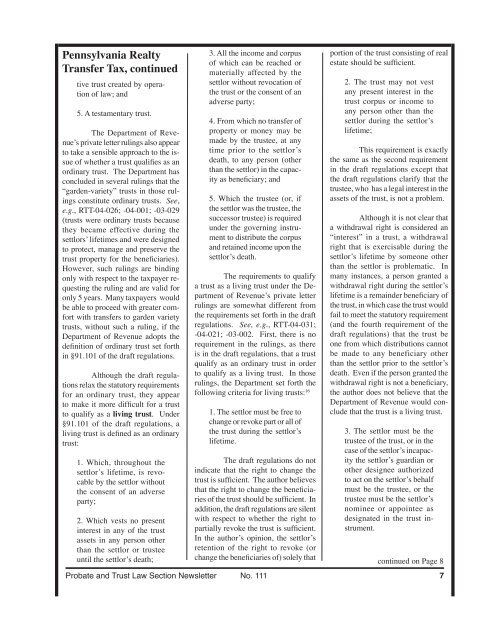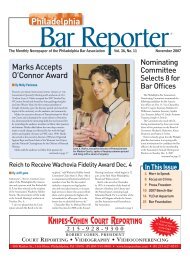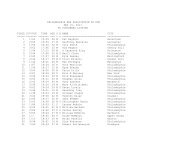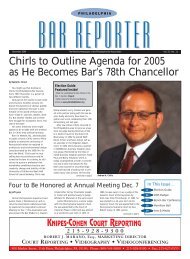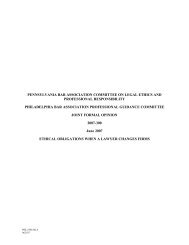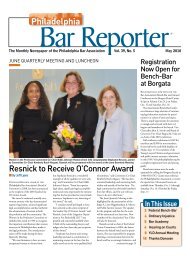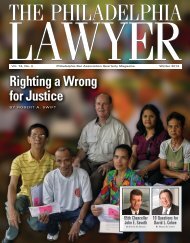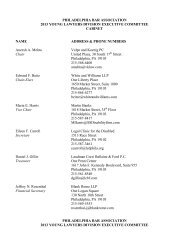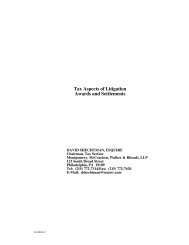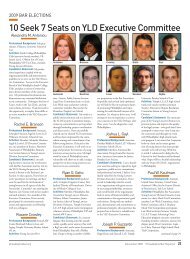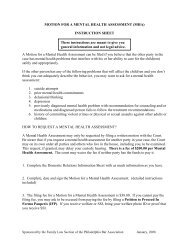Probate & Trust Newsletter: April 2005 - Philadelphia Bar Association
Probate & Trust Newsletter: April 2005 - Philadelphia Bar Association
Probate & Trust Newsletter: April 2005 - Philadelphia Bar Association
Create successful ePaper yourself
Turn your PDF publications into a flip-book with our unique Google optimized e-Paper software.
Pennsylvania Realty<br />
Transfer Tax, continued<br />
tive trust created by operation<br />
of law; and<br />
5. A testamentary trust.<br />
The Department of Revenueʼs<br />
private letter rulings also appear<br />
to take a sensible approach to the issue<br />
of whether a trust qualifies as an<br />
ordinary trust. The Department has<br />
concluded in several rulings that the<br />
“garden-variety” trusts in those rulings<br />
constitute ordinary trusts. See,<br />
e.g., RTT-04-026; -04-001; -03-029<br />
(trusts were ordinary trusts because<br />
they became effective during the<br />
settlorsʼ lifetimes and were designed<br />
to protect, manage and preserve the<br />
trust property for the beneficiaries).<br />
However, such rulings are binding<br />
only with respect to the taxpayer requesting<br />
the ruling and are valid for<br />
only 5 years. Many taxpayers would<br />
be able to proceed with greater comfort<br />
with transfers to garden variety<br />
trusts, without such a ruling, if the<br />
Department of Revenue adopts the<br />
definition of ordinary trust set forth<br />
in §91.101 of the draft regulations.<br />
Although the draft regulations<br />
relax the statutory requirements<br />
for an ordinary trust, they appear<br />
to make it more difficult for a trust<br />
to qualify as a living trust. Under<br />
§91.101 of the draft regulations, a<br />
living trust is defined as an ordinary<br />
trust:<br />
1. Which, throughout the<br />
settlorʼs lifetime, is revocable<br />
by the settlor without<br />
the consent of an adverse<br />
party;<br />
2. Which vests no present<br />
interest in any of the trust<br />
assets in any person other<br />
than the settlor or trustee<br />
until the settlorʼs death;<br />
3. All the income and corpus<br />
of which can be reached or<br />
materially affected by the<br />
settlor without revocation of<br />
the trust or the consent of an<br />
adverse party;<br />
4. From which no transfer of<br />
property or money may be<br />
made by the trustee, at any<br />
time prior to the settlorʼs<br />
death, to any person (other<br />
than the settlor) in the capacity<br />
as beneficiary; and<br />
5. Which the trustee (or, if<br />
the settlor was the trustee, the<br />
successor trustee) is required<br />
under the governing instrument<br />
to distribute the corpus<br />
and retained income upon the<br />
settlorʼs death.<br />
The requirements to qualify<br />
a trust as a living trust under the Department<br />
of Revenueʼs private letter<br />
rulings are somewhat different from<br />
the requirements set forth in the draft<br />
regulations. See, e.g., RTT-04-031;<br />
-04-021; -03-002. First, there is no<br />
requirement in the rulings, as there<br />
is in the draft regulations, that a trust<br />
qualify as an ordinary trust in order<br />
to qualify as a living trust. In those<br />
rulings, the Department set forth the<br />
following criteria for living trusts: 16<br />
1. The settlor must be free to<br />
change or revoke part or all of<br />
the trust during the settlorʼs<br />
lifetime.<br />
The draft regulations do not<br />
indicate that the right to change the<br />
trust is sufficient. The author believes<br />
that the right to change the beneficiaries<br />
of the trust should be sufficient. In<br />
addition, the draft regulations are silent<br />
with respect to whether the right to<br />
partially revoke the trust is sufficient.<br />
In the authorʼs opinion, the settlorʼs<br />
retention of the right to revoke (or<br />
change the beneficiaries of) solely that<br />
portion of the trust consisting of real<br />
estate should be sufficient.<br />
2. The trust may not vest<br />
any present interest in the<br />
trust corpus or income to<br />
any person other than the<br />
settlor during the settlorʼs<br />
lifetime;<br />
This requirement is exactly<br />
the same as the second requirement<br />
in the draft regulations except that<br />
the draft regulations clarify that the<br />
trustee, who has a legal interest in the<br />
assets of the trust, is not a problem.<br />
Although it is not clear that<br />
a withdrawal right is considered an<br />
“interest” in a trust, a withdrawal<br />
right that is exercisable during the<br />
settlorʼs lifetime by someone other<br />
than the settlor is problematic. In<br />
many instances, a person granted a<br />
withdrawal right during the settlorʼs<br />
lifetime is a remainder beneficiary of<br />
the trust, in which case the trust would<br />
fail to meet the statutory requirement<br />
(and the fourth requirement of the<br />
draft regulations) that the trust be<br />
one from which distributions cannot<br />
be made to any beneficiary other<br />
than the settlor prior to the settlorʼs<br />
death. Even if the person granted the<br />
withdrawal right is not a beneficiary,<br />
the author does not believe that the<br />
Department of Revenue would conclude<br />
that the trust is a living trust.<br />
3. The settlor must be the<br />
trustee of the trust, or in the<br />
case of the settlorʼs incapacity<br />
the settlorʼs guardian or<br />
other designee authorized<br />
to act on the settlorʼs behalf<br />
must be the trustee, or the<br />
trustee must be the settlorʼs<br />
nominee or appointee as<br />
designated in the trust instrument.<br />
continued on Page 8<br />
<strong>Probate</strong> and <strong>Trust</strong> Law Section <strong>Newsletter</strong> No. 111 7


